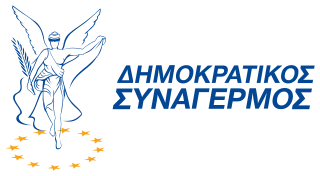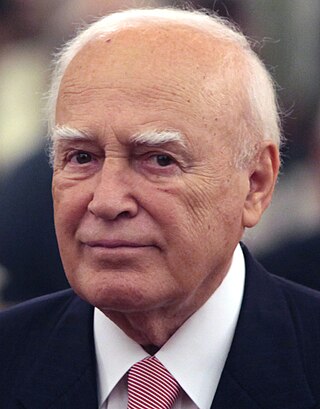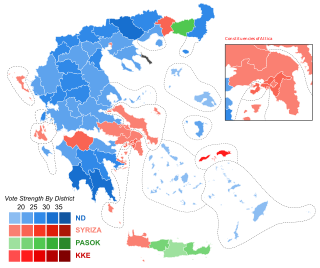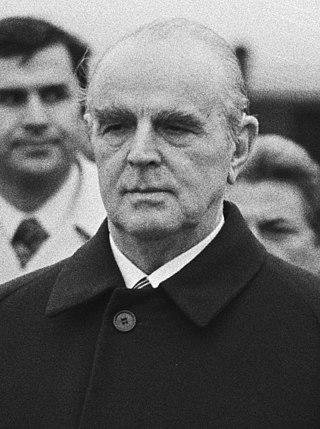
The Panhellenic Socialist Movement, known mostly by its acronym PASOK, is a social-democratic political party in Greece. Until 2012 it was one of the two major parties in the country, along with New Democracy, its main political rival.

The Democratic Rally is a Christian-democratic and liberal-conservative political party in Cyprus led by Annita Demetriou. The party was founded on 4 July 1976 by veteran politician Glafcos Clerides. Clerides served as the president of Cyprus from 1993 until 2003. From 11 March 2023, the leader of the party is Annita Demetriou, who also serves as the president of the House of Representatives from June 2021.

Karolos Papoulias was a Greek politician who served as the president of Greece from 2005 to 2015.

Prokopios Pavlopoulos, commonly shortened to Prokopis (Προκόπης), is a Greek retired politician, who served as the president of Greece from 2015 to 2020. A member of New Democracy, he previously was Minister of the Interior from 2004 to 2009. He was succeeded by Katerina Sakellaropoulou on 13 March 2020, who became the first woman to serve as President of Greece.
The Greek football PSAP awards are a number of awards given annually by the Greek Union of Professional Football Players (PSAP) (Greek: Πανελλήνιος Σύνδεσμος Αμειβομένων Ποδοσφαιριστών). These awards are given annually to players playing in the Super League Greece, Super League Greece 2 and Gamma Ethniki. Managers and referees are also awarded by the PSAP on an annual basis.

The Third Hellenic Republic is the period in modern Greek history that stretches from 1974, with the fall of the Greek military junta and the final confirmation of the abolishment of the Greek monarchy, to the present day.
The Mesovouno massacre refers to two massacres perpetrated by members of the Wehrmacht in the village of Mesovouno in Ptolemaida, Greece, during the Axis occupation of Greece, carried out on 23 October 1941 and 22 April 1944.

Legislative elections were held in Greece on Sunday, 6 May 2012 to elect all 300 members to the Hellenic Parliament. It was scheduled to be held in late 2013, four years after the previous election; however, an early election was stipulated in the coalition agreement of November 2011 which formed the Papademos Cabinet. The coalition comprised both of Greece's traditional major political parties, PASOK on the left and New Democracy (ND) on the right, as well as the right-wing Popular Orthodox Rally (LAOS). The aim of the coalition was to relieve the Greek government-debt crisis by ratifying and implementing decisions taken with other Eurozone countries and the International Monetary Fund (IMF) a month earlier.

Legislative elections were held in Greece on Sunday, 17 June 2012, to elect all 300 members to the Hellenic Parliament in accordance with the constitution, after all attempts to form a new government failed following the May elections. If all attempts to form a new government fail, the constitution directs the president to dissolve a newly elected parliament, and then to call for new parliamentary elections within 30 days of the dissolution. The president announced at 16 May the date for the new election, and signed the formal decree to dissolve the parliament and call for the election at 19 May.

Legislative elections were held in Greece on Sunday 25 January 2015 to elect all 300 members to the Hellenic Parliament in accordance with the constitution. The election was held earlier than scheduled due to the failure of the Greek parliament to elect a new president on 29 December 2014.

Greece–Nicaragua relations are foreign relations between Greece and Nicaragua. Diplomatic relations were officially established on 2 July 1965. Greece is represented in Nicaragua through its embassy in Mexico City. Nicaragua is represented in Greece through its embassy in Rome.

Indirect presidential elections were held in Greece in December 2014 and February 2015 for the succession to Karolos Papoulias as President of the Hellenic Republic. The candidate of the ND–PASOK government, Stavros Dimas, failed to secure the required majority of MPs of the Hellenic Parliament in the first three rounds of voting in December. According to the provisions of the Constitution of Greece, a snap election was held on 25 January 2015, which was won by the left-wing Syriza party. Following the convening of the new Parliament, the presidential election resumed. On 18 February 2015, veteran ND politician Prokopis Pavlopoulos, backed by the Syriza-ANEL coalition government, was elected with 233 votes.

An indirect election for the position of President of the Hellenic Republic was held by the Hellenic Parliament on 8 February 2005.

An indirect election for the position of President of the Hellenic Republic was held by the Hellenic Parliament in 1995.

Legislative elections were held in Greece on Sunday, 20 September 2015, following Prime Minister Alexis Tsipras' announced resignation on 20 August. At stake were all 300 seats in the Hellenic Parliament. This was a snap election, the sixth since 2007, since new elections were not due until February 2019.
The following lists events that happened during 2015 in Greece.

An indirect election for the position of President of the Hellenic Republic was held by the Hellenic Parliament in April–May 1980.

The anti-austerity movement in Greece involved a series of demonstrations and general strikes that took place across the country. The events, which began on 5 May 2010, were provoked by plans to cut public spending and raise taxes as austerity measures in exchange for a €110 billion bail-out, aimed at solving the Greek government-debt crisis. Three people were killed on 5 May in one of the largest demonstrations in Greece since 1973.

Legislative elections were held in Greece on 7 July 2019. The elections were called by Prime Minister Alexis Tsipras on 26 May 2019 after the ruling Syriza party lost the European and local elections. They were the first national elections since the voting age was lowered to 17, and the number of parliamentary constituencies was increased from 56 to 59. Athens B, the largest constituency before the 2018 reforms, with 44 seats, was broken up into smaller constituencies, the largest of which had 18 seats.
















